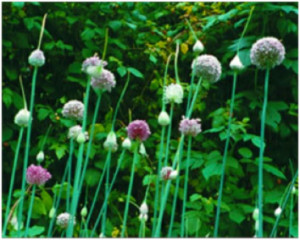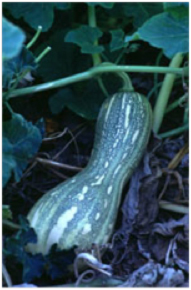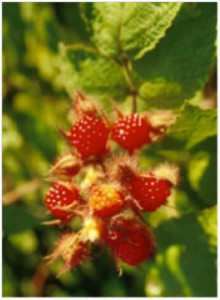by Allison Cox ©1997.
A few years ago, I traveled with my two teenage daughters to Montana where we had once lived. We were so busy visiting old friends that it wasn’t till we were on our way out of town to go back home that we finally drove over to see our old house again. The girls hadn’t seen the place since Shanon was 6 and Breean was 3. Shanon and I were excited. Breean was indifferent.
 It was early Sunday morning and the neighborhood was quiet, as though everyone was either at church or still asleep. I pulled up to a corner lot, in front of a 2 story wood-sided house. There were 2 large pine trees in front and a big maple on the side that blocked some of our view of the house. Across the street was an empty field with railroad tracks. There were only a few houses clustered nearby. The girls and I peered out from the car into the bright morning air.
It was early Sunday morning and the neighborhood was quiet, as though everyone was either at church or still asleep. I pulled up to a corner lot, in front of a 2 story wood-sided house. There were 2 large pine trees in front and a big maple on the side that blocked some of our view of the house. Across the street was an empty field with railroad tracks. There were only a few houses clustered nearby. The girls and I peered out from the car into the bright morning air.
“Is this it?” Breean asked from the back seat.
“Yes!” Shanon and I answered together.
“But I remembered it being bigger,” Shanon said. “And did the roof always sag like that?”
“I don’t remember it at all.” Breean said and then added with typical teenage honesty, “It looks kind of dumpy.”
“Well, I suppose it does now, but to your Dad and I, it was beautiful. It was the first house we ever owned. This is the first place you ever lived when you were born, Breean. But, really, the best part was the garden in the back. Let me show you.”
I pulled around the corner and along the side yard, pointing to the 2 apple trees shading the back porch.
“Remember when we used to press apples for cider and make a ton of apple sauce?”
Shanon nodded. Breean shook her head “no”. Then I turned my car down the alley and pulled up behind the house and coasted to a stop at the back of the lot.
“Oh my God! It’s gone. It’s all gone.”
“What’s gone?” Breean asked, leaning forward toward my seat.
“The garden.” Shanon whispered.
It had been 15 years since we had seen the place. I knew logically that someone may not be tending the garden anymore, but to see the fenced garden area completely empty was a shock.
“Why would someone dig out all the raspberries? Even the currant bush is gone!”
Shanon turned to her younger sister,
“There used to be a huge raspberry patch right there. Don’t you remember Breean?”
Breean shrugged.
“I used to send you two out there with empty margarine tubs to pick berries and you’d both comeback with your cheeks, lips and hands stained and just a few mushed berries in the bowls. Now it’s
all gone…”
I looked at Breean imploringly. Breean shrugged again.
“I was only three, Mom. I don’t remember.”
Shanon leaned over and touched my hand and pointed next door, saying,
“Wasn’t that where the neighbor lived who always gave us candy?”
“Well, I guess all the neighbors must be gone now too. Yes, that was Louise Taylor’s house. Neither of you could ever say her name right. You always called her “Touise” and she used call you two her “little sweet peas”. First time I met her, we had just moved in. I was standing over there in the garden and I heard a voice say,”
“Nobody’s taken care of that garden for years. Are you a gardener?”
I turned to see a small, elderly lady with violet hair leaning on the fence that separated our yards. She had a basket of flowers hooked over one arm.
“I guess I’m going to have to learn!” I said.
Louise smiled. I guess it was the right answer, ’cause that was the beginning of our friendship.
Soon, Louise introduced me to our neighbors who lived across the alley, Paul and Mary Mertz. Paul was as tall and slim as Mary was short and round. They were retired and spent most of their time fishing. Now and then, they would appear at the back door with salmon or mackinaw, saying,
“We’ve got a ton of these in the freezer, so we thought maybe you’d like some.”
They knew money was tight for us back then.
Across the side street were the Hacks. Louise marched me across the street and introduced me to Margaret and Walter. They both looked older than Louise. The Hacks were tiny people who always looked bundled up, even in the summer. Walter wore a wool hat all year round. And Margaret must have never cut her hair in her life. She wore it parted down the middle, braided one long braid on each side of her head and then she wound the braids back and forth across the top of her head to form a woven crown of silver hair. Both of them spoke with accents. For some reason, perhaps their age or their dignified manner, I always felt compelled to call them Mr. and Mrs. Hack.
 Each of my neighbors had a garden and it was while we were out in our gardens that we would wave to each other and meet at the fences to visit. One day, I made an extra big batch of zucchini bread, so I shared a loaf with each of the neighbors. When I brought some over to Mrs. Hack, she seemed pleased and thanked me over and over. So I took advantage of the opportunity to satisfy my curiosity and asked,
Each of my neighbors had a garden and it was while we were out in our gardens that we would wave to each other and meet at the fences to visit. One day, I made an extra big batch of zucchini bread, so I shared a loaf with each of the neighbors. When I brought some over to Mrs. Hack, she seemed pleased and thanked me over and over. So I took advantage of the opportunity to satisfy my curiosity and asked,
“Mrs. Hack, were you born in this country?”
“Oh no,” she said. “I came over by boat with my little sister. I was only 14 and she was 6. We came all the way across Canada and there I met Walter. We were married when I was 16 and then we came down to Montana.”
“But where were you born?”
I persisted, curious to learn the origin of her accent and hairstyle.
A shadow seemed to pass over her face. She looked down, fumbling for words and finally said,
“I forget.” Then she turned and called, “Leonard, time for lunch!”
She waved goodbye to me as he slowly made her way to her back door. A huge middle aged man emerged from the garage. He had a crew cut and dark circles under his eyes. He moved almost mechanically. I waved hello to him, but he quickly looked down and followed Mrs. Hack into the house.
I crossed the street and went over to the Mertz’s driveway. Paul was cleaning fish and Mary was shelling peas. I told them about my conversation with Mrs. Hack.
“How can you forget where you’re born?” I asked them.
Paul and Mary stopped their tasks and looked at each other and then back at me and Mary said,
“Well, the borders have changed over the years, so she’s not sure what the country is called now.”
“Mother, you know that’s not the reason she says that.”
Paul corrected her as he scraped fish scales onto the newspaper he had spread over the grass.
“Well, yes,” Mary agreed, “You see honey, she’s afraid that if she tells you, that you’ll think she’s a Communist.”
“Really?”
I asked incredulously. They both nodded. I was amazed. Then I remembered another question.
“Who’s Leonard?”
“Oh that’s just their youngest son.” Mary explained, “He lives with them, but hardly ever comes out.”
So that explained why I hadn’t seen him before. From time to time, I would catch sight of Leonard, usually lumbering along behind his father, carrying stacks of wood or bags of groceries into the house. He was at least a foot taller and twice as wide as Mr. Hack. It was hard to believe that this behemoth of a man had come from these 2 tiny people. Whenever I saw him, I would wave hello, but Leonard would always turn away and hurry into the house. One day Louise watched this happen and called softly from the fence,
“Don’t mind Leonard, Dear. He’s not quite right in the head. Never has been.”
“Really?” I said coming closer to the fence.
“Really?” I said, coming closer to the fence as Louise continued.
“When he was born, they thought he would never survive. Some people told Margaret that it would be best if he didn’t. You see, he had a hole in his side.”
“What do you mean ‘a hole in his side’?”
Louise shrugged.
“Well, I don’t know what else to call it. Medicine was different back then. The doctors told Margaret that they couldn’t close it up and that Leonard would probably die. But Margaret wouldn’t listen to them. I remember she used to carry him around on a pillow with a cotton cloth wrapped around his stomach where the hole was. She carried him everywhere she went… hanging up the laundry, picking vegetables, weeding flowers. Never let him out of her sight. And all the while she was always talking to him, singing to him, telling him stories. Well, somehow that hole closed up on it’s own. Took a long time, but it healed. Leonard started growing. Took him a couple of years, but he even started walking. But his mind never grew along with his body. It just stayed simple. And he never speaks. You can wave to him over and over, but he’ll never wave back.”
I thought a lot about what Louise had told me, but for some reason, I never stopped waving to Leonard.
 Now, on Sunday mornings in the summer, often the girls would wake up early. I would dress them quietly and together we would slip outside, so their Dad could get one morning a week that he could sleep in. We would sit on the shaded pathways between the 6 tall rows of raspberries and reach up to pick our breakfast. The girls would wander from row to row, claiming each one held better berries than the last.
Now, on Sunday mornings in the summer, often the girls would wake up early. I would dress them quietly and together we would slip outside, so their Dad could get one morning a week that he could sleep in. We would sit on the shaded pathways between the 6 tall rows of raspberries and reach up to pick our breakfast. The girls would wander from row to row, claiming each one held better berries than the last.
“Here, Breean. Pick over here.”
“No, here Shan. Here!”
After awhile, they would settle into a spot and between the humming of the bees and the morning song of birds, I could hear Shanon tell her little sister her own version of the bedtime story that I had read to them the night before. I suddenly had an image of a younger Margaret Hack, picking peas in her garden while she told Leonard stories as he lay on his pillow nearby.
One Sunday morning, the girls were gone. They had spent the night at their grandparents and wouldn’t be back til after lunch. But I woke early anyway and missed them. So I slipped out to the garden and sat in the cool shade between the raspberry rows, savoring the silence and the green. One by one, I heard each of my neighbors leave their homes and drive off to church. I smiled to myself, thinking
“I can’t go anywhere to feel closer to God than right here in the garden.”
And that’s when I heard it. The music. It was someone playing the piano. You could tell it wasn’t a recording because it would suddenly stop and take an entirely different turn. It wasn’t exactly classical. In fact I couldn’t think exactly how to describe it. It was raw… and flowing… and beautiful.
I got up and followed the sound to the front of our house. It was coming from across the side street. I crossed the street and went past the Hack’s house, but I realized that I had gone too far. I took a few steps back and looked in the Hack’s front picture window. There sat Leonard in profile playing an old upright piano. His eyes were closed and he was swaying side to side, with the music. Leonard, who never talked and rarely left the house was playing this incredible music.
I don’t know how long I stood and watched and listened. But in one of his pauses , before the music would suddenly take a new turn, he started to look in my direction, so I walked on, not wanting to invade his reverie.
For some reason, I kept my discovery a secret from the neighbors. But the next Sunday morning, when the girls and I were in the garden, I suddenly whispered to them,
“Shhhh… listen.”
They stopped their chatter and through the quiet, through the humming of the bees, through the green of the leaves, we heard the music playing.
“Where’s it coming from?” Shanon whispered from the next row.
Fairies.” I told them.
“Ah!” they cried softly and leaned into each other, nestly down to listen.
In that moment I knew. I understood how it was that Margaret Hack had healed her son, the baby with the hole that wouldn’t heal. The baby that was supposed to die. She had poured all her words, all her songs, all the stories of her life into him, till he was filled with love. And now, on Sunday mornings, when Leonard thought that the world was his alone, it all came pouring back out.
“I remember!”
“What?” I asked, stopping my story.
“I remember,” Breean repeated from the back seat. “The music. The fairy music. Sitting in the bushes and listening to the fairy music. That part, I remember.”
Shanon and I turned to see Breean, who had been so blasé, before, now smiling and excited.
“Where did he live again?” she asked.
“Across the street. But the Hack’s are dead by now. The Mertz’s and Louise are gone too. I doubt that he’d be living there now, by himself.”
“Show me.” Breean insisted.
So, I started the engine, drove down the alley and back around the block, and coasted to a slow stop in front of the Hack’s old house. And there, on Sunday morning, sitting in profile at the piano in the front window, was Leonard. The windows were shut, but we could softly hear… music. Beautiful piano music.
“It’s him.” I whispered.
“Ah!” they sighed and leaned into each other and the open window to listen. We sat there for only seconds, watching Leonard’s body sway as his hands danced across the keys, and then I slowly pulled away. I glanced back as I pulled out… one last look. And it seemed to me, at that moment, as Leonard sat there at the piano swaying, that after all these years… Leonard was finally waving back.
Notes on the Story
This story rises out of my experience of being part of a community on my own for the first time with my own young family. This small group of neighbors taught me to cherish their friendships and to learn to appreciate miracles like Leonard, the hero of my story. When I told this story at the Yukon Storytelling Festival, a very young girl (no more than 5 years old) met me with her parents at the side of the stage when I was done telling this tale and she asked me, “Is Leonard real?” I could tell it was a very important question for this child. I assured her with the truth – that Leonard was very real and for all I knew, he was still playing that piano on Sunday mornings in that small town in Montana… When I have shared this story with others, I then invite them to tell a story about the everyday miracles they have come across in their own neighborhoods. The young listeners who responded when I was visiting the juvenile detention center had a myriad of miracles to share – even while they sat there in their orange prison garb inside the brick walls – miracles were still happening! — Allison Cox
